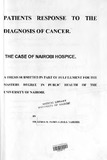| dc.description.abstract | Palliative care is the active total care of patients whose disease is not responding to curative treatment. Control of pain and other symptoms is aimed at improving the patient's quality oflife. Palliative care is one institution of health care that has received minimum attention from all sectors of the Kenyan society. Pain is undoubtedly the most important symptom that requires alleviation in terminally ill cancer patients (TICPs). Cancer pain on the other hand is a neglected public health problem. This is mainly due to lack of knowledge regarding comprehensive cancer therapy. Patients' knowledge about cancer and their belief systems are important in determining how they respond to the cancer diagnosis and their health seeking patterns.
The diagnosis and treatment of cancer can cause major problems for patients and their relatives as they try to adapt to a fearful diagnosis and an uncertain future. In the vast majority of the studies pertaining to care of the TICPs the primary informants have been the family members, and not the patients. This has always been done after the patient's death but the accuracy of these
surrogate accounts is open to question. The main objective of this study was to determine the patients' response to cancer diagnosis and identify the various health seeking behaviour patterns. The study also aimed at identifying various coping mechanism with which the patients possessed in trying to live with the illness. These were done using in-depth interviews of patients that were purposefully selected and focus group discussions. Denial is the coping mechanism exhibited by most afflicted cancer patients in trying to live with cancer. The commonest cancers seen at the Nairobi Hospice included breast, cervical and head and neck lesions. Health education and promotion campaigns with respect to cancer especially breast and cervical cancers needs to be instituted to prevent late diagnosis. The study was carried out at the Nairobi Hospice. From the onset recorded data over a 10-year period (1991-2000) was studied in order to identify the trend and characteristics of patients who had previously visited the institution. An analysis of a 10-year recorded data showed a total of 2992 cases. Their demographic characteristics revealed 39% were males while 61 %were females. 84.7%of the patients were above 31 years old. The three most common cancers seen according to diagnosis by site included: breast cancer 20.7%, cervical cancer 16.8% and head and neck lesions 16.1 %. An in-depth interview was conducted among eleven patients. All the respondents revealed that they were not aware of the initial signs of cancer. They did not relate the signs they experienced to any disease let alone cancer, thus ignored them. Health provider advice was only sought if the symptom persisted or worsened (increased in size or pain). Complete denial, selective denial, anger, fear and acceptance were some of the emerging responses to cancer diagnosis. One patient responded by denying that he had cancer and thus did not undergo the necessary treatment. Religion played an important role in perceived causality and acceptance of the diagnosis. Most patients said it was the will of God that they were ill. Other patients said they had given their lives to God and were not scared of death because of their belief in life after death and that "when I die I am going to be with God." Similar sentiments came out in the focus group discussions. In conclusion this study shows that patient awareness of the initial signs and symptoms of cancer is still very low. There is fear of cancer in our society, which tends to equate the disease to death. | en_US |

